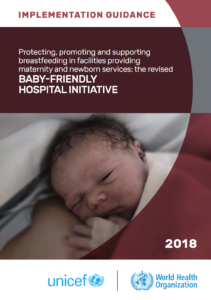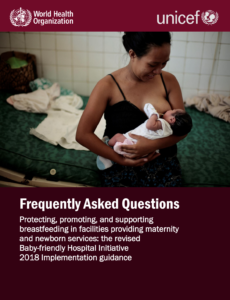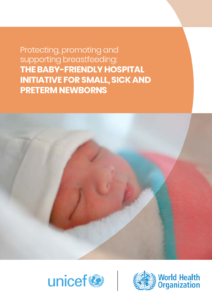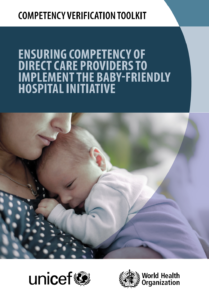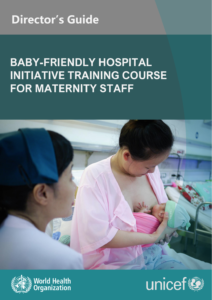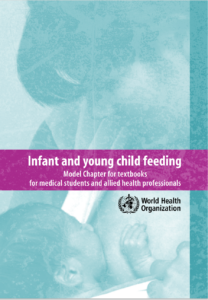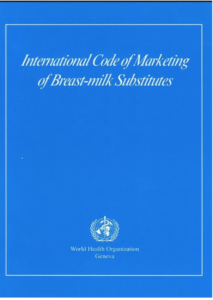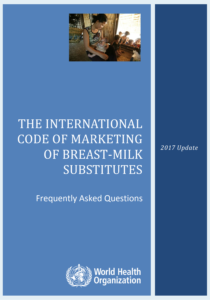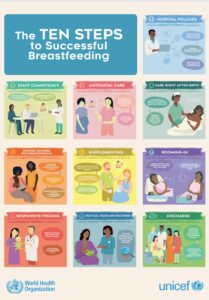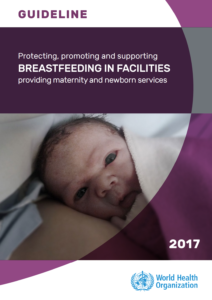The United Nations Children’s Fund (UNICEF) and World Health Organization (WHO) have prepared several documents for countries and hospitals to use for developing plans to implement the Baby-Friendly Hospital Initiative. The purpose of each of these documents is described below.
IMPLEMENTATION GUIDANCE: PROTECTING, PROMOTING AND SUPPORTING BREASTFEEDING IN FACILITIES PROVIDING MATERNITY AND NEWBORN SERVICES:
THE REVISED BABY-FRIENDLY HOSPITAL INITIATIVE
PURPOSE: This document provides information to the BFHI National Committees and hospitals on the minimum global standards that must be achieved in order to properly implement the Ten Steps to Successful Breastfeeding and achieve the Baby-Friendly Designation. Countries may customize the implementation strategies while focusing on achieving the described outcomes. NOTE: Some countries are still in the process of transitioning from the 2009 requirements to the 2018 ones.
IMPORTANT: The list of competencies found on page 15 of this document have been replaced by those included in the Competency Verification Toolkit described below.
Coming soon.
PURPOSE: This document provides responses to common questions raised about selected portions of the BFHI Implementation Guidance.
Coming soon.
PROTECTING, PROMOTING AND SUPPORTING BREASTFEEDING:
THE BABY-FRIENDLY HOSPITAL INITIATIVE FOR SMALL AND PRETERM INFANTS
PURPOSE: This document provides guidance on the application of the Ten Steps to Successful Breastfeeding for small, sick and preterm newborns and their mothers.
Coming soon.
COMPETENCY VERIFICATION TOOLKIT:
ENSURING COMPETENCY OF DIRECT CARE PROVIDERS TO IMPLEMENT THE BABY-FRIENDLY HOSPITAL INITIATIVE
PURPOSE: This toolkit provides comprehensive guidance and resources vital to the implementation of the 2018 revised Step 2.
IMPORTANT: The list of competencies included in this document replace those listed on page 15 of the 2018 BFHI Implementation Guidance.
Video demonstrating the competency verification process.
Coming Soon.
BABY-FRIENDLY HOSPITAL INITIATIVE TRAINING COURSE FOR MATERNITY STAFF
PURPOSE: This document and the related course materials provide the basis for basic training for direct care providers who have little or no previous experience or education in breastfeeding management, support and care. Sections of the material may also be helpful when the competency verification process identifies that staff need to improve their knowledge of certain topics.
Coming soon.
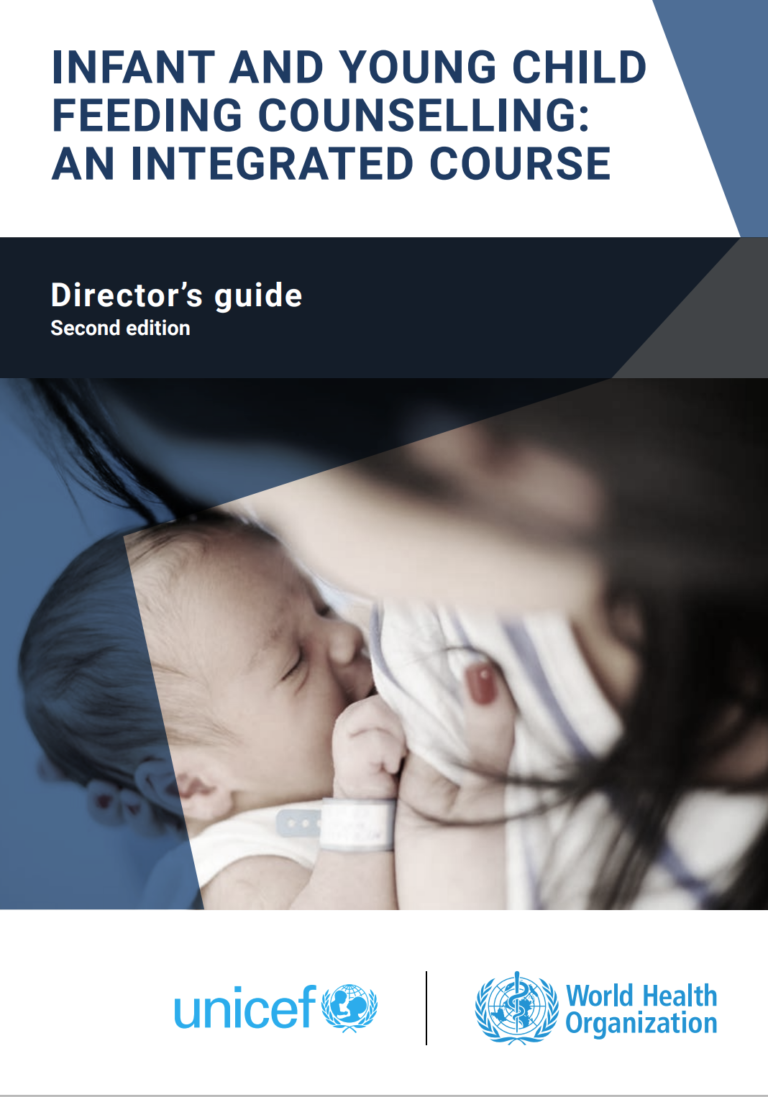
INFANT AND YOUNG CHILD FEEDING COUNSELLING:
PURPOSE: This document and the related course materials provide the basis for basic training on counselling skills. This material may also be helpful when the competency verification process identifies that staff need to improve their counselling skills.
Coming soon.
INFANT AND YOUNG CHILD FEEDING
MODEL CHAPTER FOR TEXTBOOKS FOR MEDICAL STUDENTS AND ALLIED HEALTH PROFESSIONALS
PURPOSE: This document was designed to be incorporated into textbooks for health professionals. It is also an extremely valuable resource for proving training to direct care providers who have limited or no previous education in breastfeeding management, support and care. Sections of the document may also be helpful when the competency verification process identifies that staff need to improve their knowledge of certain topics.
Coming soon.
THE INTERNATIONAL CODE OF MARKETING OF BREAST-MILK SUBSTITUTES (THE CODE)
PURPOSE: This document contains the statement endorsed by the 33rd World Health Assembly (WHA) in May 1980 as well as recommendations agreed by consensus at a joint WHO/UNICEF meeting and made particular mention that “There should be an international code of marketing of infant formula and other products used as breast-milk substitutes.”
IMPORTANT: Subsequent World Health Assemblies have passed additional resolutions related to the code. Those resolutions add important and timely clarifications and updates. These resolutions have not been consolidated into a single document but may be found on the WHO website using the link above.
Coming soon.
THE INTERNATIONAL CODE OF MARKETING OF BREAST-MILK SUBSTITUTES
PURPOSE: This document provides responses to common questions raised about the International Code of Marketing of Breast-milk Substitutes.
Coming soon.
THE TEN STEPS TO SUCCESSFUL BREASTFEEDING (THE TEN STEPS)
PURPOSE: This document is a poster that is intended to be hung in facilities to inform patients of their implementation of the Ten Steps and provide a brief explanation as to what each step requires.
LINK TO INDIVUDAL TEN STEP INFOGRAPHICS
Coming soon.
PURPOSE: This document provides a summary of the selected evidence reviewed along with the decision-making process used to make key recommendations associated with the 2018 revised Ten Steps to Successful Breastfeeding.
Coming soon.

